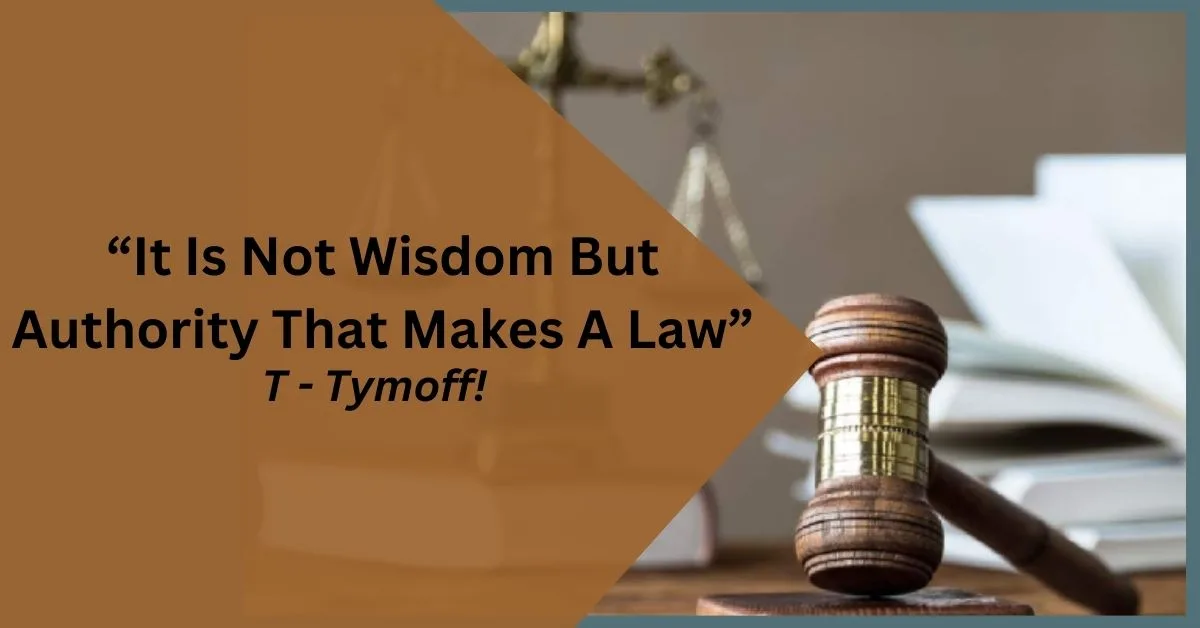Introduction
The quote “It is not wisdom but authority that makes a law. – T. Tymoff” presents a provocative perspective on the foundation of legal systems. This statement challenges the conventional belief that laws are primarily based on wisdom, ethical principles, and rationality. Instead, it asserts that the true force behind the creation and implementation of laws is authority. To fully understand this perspective, we must delve into the dynamics between wisdom and authority within legal frameworks. This view aligns with the philosophies of thinkers like Thomas Hobbes, who argued that the legitimacy of laws derives from the sovereign authority that enforces them, rather than from any intrinsic moral value. The quote invites us to reconsider how laws are formulated and the role that authority plays in ensuring their adherence.
Authority and Law Enforcement
Authority is a cornerstone of lawmaking and enforcement. Governments and legislative bodies possess the power to create laws and ensure compliance through law enforcement agencies. This authority is crucial for maintaining order and preventing chaos. However, the quote by T. Tymoff highlights a potential pitfall: when laws are crafted solely based on authority without the guidance of wisdom, they risk being unfair or oppressive.
The Authority Dilemma
The Power of Legislation
At first glance, it might seem that the essence of law lies in its wisdom, derived from the collective knowledge and moral compass of a society. However, a closer examination reveals that authority plays a pivotal role in the creation and enforcement of laws. Without authority, even the wisest laws would lack the necessary backing to be effective.
Authority vs. Wisdom
The Role of Authority
Authority, often vested in governing bodies or individuals, possesses the legal and institutional power to establish and maintain laws. This authority is essential for the functioning of any legal system, as it provides the framework within which wisdom can operate. Without authority, the implementation and enforcement of laws would be chaotic and ineffective.
The Wisdom Factor
While authority sets the stage, wisdom contributes to the quality and fairness of the laws. Wisdom encompasses ethical considerations, societal values, and the ability to foresee consequences, all of which are vital in crafting just and equitable legislation. Wisdom ensures that laws serve the common good and reflect the moral standards of the society they govern.
The Interplay Between Authority and Wisdom
Striking a Balance
To achieve effective and just laws, a delicate balance between authority and wisdom is necessary. Overemphasis on authority may result in oppressive or unjust laws, while an overemphasis on wisdom might lead to a lack of enforceability and societal order. The ideal legal system integrates both elements to create laws that are both enforceable and fair.
Historical Perspectives
The Influence of Authority
Throughout history, we can observe instances where laws were dictated by authoritarian regimes, emphasizing authority over wisdom. These regimes often imposed laws to maintain control, even if they were not inherently just or wise. Such laws were often met with resistance and led to social unrest.
Wisdom-Led Reforms
Conversely, some pivotal moments in history have witnessed the triumph of wisdom over mere authority. Reforms driven by the collective wisdom and moral conscience of society have led to the revision of unjust laws. Examples include the abolition of slavery and the civil rights movement, where wisdom and moral judgment prevailed over entrenched authority.
Contemporary Applications
Modern Legal Systems
In today’s world, democracies and legal systems are designed to incorporate both authority and wisdom. Elected representatives create laws based on the wisdom of the people, while institutions uphold these laws with their authority. This dynamic interplay ensures that laws are both just and enforceable.
Ethical Considerations
The Moral Imperative
Contemporary discussions on law often revolve around ethical considerations. Laws should not only be authoritative but also reflect the collective wisdom and values of the society they govern. This requires ongoing dialogue and participation from all segments of society to ensure that laws remain relevant and just.
Adaptation and Change
In an ever-evolving world, legal systems must adapt to changing societal norms and values. This requires a dynamic interplay between authority and wisdom to ensure that laws remain relevant and just. Legal reforms and amendments are essential to address new challenges and uphold justice in a changing world.
Relevance to Legal Theory and Practice
The quote is particularly relevant in contemporary discussions about legal theory and practice. In many modern legal systems, there is an ongoing debate about the extent to which laws should be influenced by ethical considerations versus the necessity of authoritative enforcement. This debate is central to understanding how laws can be both effective and just.
Enforcement and Compliance
The quote also highlights the critical role of authority in the enforcement of laws. Law enforcement agencies and judicial bodies are empowered with the authority to ensure compliance with legal mandates. This authority is essential for maintaining the rule of law and ensuring that individuals adhere to established norms and regulations.
Enforcement is a key aspect of the legal system, as it translates the theoretical framework of laws into practical application. The presence of authoritative figures, such as police officers and judges, serves as a deterrent to unlawful behavior. These figures have the power to impose penalties and sanctions, which creates a sense of accountability among citizens and promotes adherence to the law.
Moreover, the quote suggests that the legitimacy of law enforcement is contingent upon the perceived legitimacy of the authority exerted. This legitimacy is derived from the ethical and moral grounding of the laws being enforced. When individuals believe that laws are just and reflect societal values, they are more likely to comply with them. Thus, while authority is necessary for enforcement, it must be tempered by wisdom to ensure fairness and justice.
The Role of Authority in Lawmaking
The quote asserts the pivotal role of authority in the legal system. Authority is the legitimate power vested in entities like legislative bodies, law enforcement agencies, and the judiciary to create, enforce, and interpret laws. This power ensures that citizens adhere to the established legal framework, maintaining order and stability within society.
In democratic systems, authority is typically granted through a process of representation, where elected officials are empowered to make laws on behalf of the people. This delegation of authority is essential for the functioning of large, complex societies where direct participation in every decision is impractical. However, the quote suggests that the mere possession of authority does not guarantee the wisdom or justice of the laws created. The effectiveness and fairness of legal systems depend on how this authority is exercised and checked.
Authority as a Means of Enforcement
The quote underscores the necessity of authority in the enforcement of laws. Without the power to enforce, laws would be mere suggestions without practical impact. Authority equips enforcement agencies with the means to ensure that laws are followed, thereby maintaining societal order and stability.
Enforcement mechanisms include a range of activities such as patrolling, investigating, and prosecuting violations. The presence of law enforcement officers serves as a deterrent to unlawful behavior, as individuals are aware of the consequences of breaking the law. This deterrent effect is a crucial aspect of maintaining compliance and ensuring the effectiveness of legal norms.
However, the quote also points to the potential for the abuse of enforcement power. When authority is exercised without ethical considerations or accountability, it can lead to oppressive practices and the erosion of public trust in the legal system. Ensuring that enforcement is carried out fairly and justly requires integrating wisdom into the exercise of authority. This involves training law enforcement officers in ethical practices, implementing oversight mechanisms, and fostering a culture of accountability.
The legitimacy of legal authority is crucial for effective enforcement. When citizens perceive laws as fair and just, they are more likely to comply voluntarily. Conversely, laws that are seen as arbitrary or unjust can lead to resistance and non-compliance. The quote emphasizes the importance of aligning authority with moral and ethical principles to ensure that laws are respected and adhered to.
Conclusion
In conclusion, the quote “It is not wisdom but authority that makes a law. – T. Tymoff” underscores the crucial interplay between wisdom and authority in both the creation and enforcement of laws. While authority provides the necessary force to enact and uphold laws, wisdom ensures that these laws are just, equitable, and reflective of societal values. This balance is essential for maintaining the legitimacy and effectiveness of legal systems, promoting a just and orderly society.
By ensuring that authority is exercised responsibly and in alignment with societal values, legal systems can maintain order and promote justice.
FAQs
1. Who first used the adage “It is not wisdom but authority that makes a law”?
Thomas Hobbes, a philosopher from the 17th century, is frequently credited with coining the expression in his book “Leviathan.”
2. How may wisdom be applied to contemporary law?
In order to establish just and equitable laws, legal experts, advisory panels, and public participation can all contribute to wisdom in modern lawmaking.
3. What happens when wisdom is ignored when drafting laws?
When authority takes precedence over wisdom, there is a risk of passing unjust or unfair laws, which could cause social unrest and discontent.
4. Can laws shift from being based on authority to being based on wisdom?
Yes, by including citizen participation, professional counsel, and ethical concerns in the drafting of laws, legal systems can advance toward a more wisdom-driven approach.
5. How does this idea affect societal perceptions of justice?
The way that authority and wisdom interact while drafting laws has a significant impact on how society views justice. Achieving the ideal balance guarantees that laws are just, fair, and in the best interests of all societal members.

